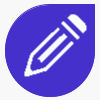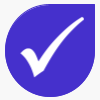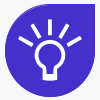 What Is It?
What Is It?
Reflection spaces and private journaling provide a place for your students to reflect more deeply on the content they're learning and to do so with greater privacy than a discussion board allows. These reflective spaces are, ideally, more like conversations than diaries; they're places where you as an instructor have a chance to converse and connect with your students. Private journals and reflection spaces can serve a range of pedagogical purposes: reinforcing reading, encouraging self reflection and evaluation, providing retrieval practice opportunities, checking prior knowledge, and more.
 Watch our half-hour webinar on private journaling
Watch our half-hour webinar on private journaling
 How to Create a Private Journal or Reflection Space in Harmonize
How to Create a Private Journal or Reflection Space in Harmonize
- Create a graded discussion in Harmonize.
- Set the discussion to be private between the instructor and the student.
- Set milestones and milestone word count minimums to encourage regular, substantial reflection.
- Consider using auto-grading to signal that this is an effort-based, low-stakes assignment.
- Monitor the assignment using the Activity feature, being sure to comment and engage with students.
 Tips and Strategies
Tips and Strategies
Make it meaningful.
Journaling can feel like busy work if students don’t understand the purpose and don’t receive any feedback. Make sure students know you’re reading their work and state why the task matters in the instructions.
Personalize it.
Include prompts that ask students to connect their reading to their own experiences. This helps students make connections with the material while also making it harder to use AI.
Make it predictable.
Set milestones at regular intervals: either the same time each week, or at the start or end of each unit/topic/major assignment.
Try multimodal.
A reflection or journal doesn’t have to be text. Allowing students to record video or record audio is a great UDL (Universal Design for Learning) practice. As a bonus, audio/video is harder to fake with AI!
Consider a group journal.
We normally think of journaling as a private activity, but consider having your class keep a group journal. Students benefit from seeing each other’s reflections and realizing they’re not alone in their struggles. For this option, set visibility to "Everyone."
Make it low stakes.
Try auto-grading to make the assignment low-stakes. This promotes honest and heartfelt reflection. For group journals, consider making the discussion anonymous.
Give specific options/prompts.
Students love having some guidance, but they also like choice. Try prompting our AI Brainstorming tool with something like this: “I want my students to reflect on the reading this week. I want them to have three different reflection options to choose from.” (Note: You may need to lower Bloom's taxonomy level and/or remove peer engagement components.)
Don't forget comments.
You might rely heavily on milestones requiring posts, but you can also mix in some milestones requiring comments. Then students can reflect on how their ideas have changed.
 Specific Ideas
Specific Ideas
| Assignment | What | Why |
|---|---|---|
| Self Reflection | Assign self reflection so students can think about what and how they’re learning, how they feel about their performance, how they want to change study habits going forward, etc. | Helps students process the material, think critically about their study habits, and recognize their own growth. |
| Reading Log | Have students log details about (or respond to) their reading. You could even do a reading “blog” where students share their posts at the end (you can do this by switching visibility to “public”). | Helps students keep track of reading, process and retain reading, and make connections. Potential source for paper ideas. |
| Homework Log | Each week, have students upload a picture of their work on a “show-your-work” problem they thought was tricky. Then they can respond to their picture and explain how they figured it out (or why they’re still confused). They could even use the annotation tools to respond. Alternatively, ask students to record a video in which they talk through their thought process on the problem. | Students might work many problems in a given week. This gives them a chance to highlight and reflect on one, so the instructor can give feedback on just that (lightening grading load while helping the student reflect on their learning). |
| Knowledge Check | Ask students about prior knowledge before each topic in a unit or module. At the end of the topic, students can read their initial posts and reflect on what they’ve learned since. They could reply to the initial posts or write a new post. | Helps learners connect what they’re learning to things they already know. Particularly helpful for adult learners, who bring a lot of prior knowledge and experience with them. |
| Self Evaluation | Have students evaluate their work (either the product or the process) at different points in the semester. Check out “Exam Wrappers” for questions from different disciplines. | Helps develop metacognitive skills. Helps students improve study skills and/or develop a critical eye for their own work. |
| Retrieval Practice | Ask students to type (or record a video of!) everything they learned in a week. Or ask them to connect everything they learned this week to stuff in previous weeks. Remind students they won’t be graded for accuracy and should NOT consult notes or the textbook for this–retrieval practice involves pulling information from storage in memory. | “Retrieval practice is the process of asking students to ‘retrieve’ information from their memory, the repeated act of which strengthens the process of retrieval and improves the recall of that information” (Four Strategies to Implement Retrieval Practice in Online Courses). |
 Further Reading
Further Reading
- “Reflection in Learning” by Bo Chang, Ball State University
- “Activating Prior Knowledge” from Virginia Tech’s Center for Excellence in Teaching and Learning
- “What is Retrieval Practice?” from WashU’s Center for Teaching and Learning
- “The Paper Mirror: Understanding Reflective Journaling” by Delaura L. Hubbs and Charles F. Brand